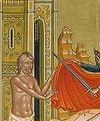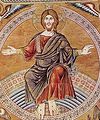

| Previous day | Next day |
| Old Style
February 10
|
Sunday |
New Style
February 23
|
| Meat-fare Sunday. Tone 3. | No fast.
|
![]() Hieromartyr Charalampus, bishop of Magnesia in Asia Minor, and Martyrs Porphyrius and Baptus (202).
Hieromartyr Charalampus, bishop of Magnesia in Asia Minor, and Martyrs Porphyrius and Baptus (202).
Martyrs Ennatha, Valentina, and Paula, of Palestine (308). St. Anna of Novgorod (1050). St. Prochorus of the Kiev Caves (1107). St. Longinus, founder of Koryazhemka Monastery (Vologda) (1540). St. Raphael, archimandrite (1765), and St. Ioannicius, hieromonk (1882), of Svatogorsk Monastery. Synaxis of Novgorod Hierarchs: Sts. Joachim (1030), Luke the Jew (1060), Germanus (1095), Arcadius (1162), Gregory (1193), Martyrius (1199), Anthony (1231), Basil (1352), Moses (1362), Symeon (1421), Gennadius (1504), Pimen (1571), and Athonius (1653).
“Areovindus” (“Fiery Vision”) Icon of the Most Holy Theotokos.
St. Scholastica of Italy (543), sister of St. Benedict of Nursia. St. Anastasius II, patriarch of Jerusalem (706). St. John Chimchimeli of Bachkovo and Gremi (13th c.).
Thoughts for Each Day of the Year
According to the Daily Church Readings from the Word of God
By St. Theophan the Recluse

Meat-fare Sunday (35th). [I Cor. 8:8–9:2; Matt. 25:31–46]
The great judgement! The judge cometh in the clouds, surrounded by a countless multitude of bodiless heavenly powers. Trumpets sound over all the ends of the earth and raise up the dead. The risen regiments pour into the determined place, to the throne of the Judge, having already a foreboding of what verdict will sound in their ears, for everyone’s deeds will be written on the brow of their nature, and their very appearance will correspond to their deeds and morals. The division of those on His right hand and those on His left will be accomplished in and of itself.
At last all has been determined. Deep silence falls. In another instant, the decisive verdict of the Judge is heard: to some, “Come,” to the others, “depart.” “Have mercy on us, O Lord, have mercy on us! May Thy mercy, O Lord, be on us!” they shall say, but then it will already be too late to plead. We need to take the trouble now to wash away the unfavourable marks written upon our nature. Then, at the judgment, we would be ready to pour out rivers of tears in order to wash ourselves; but this would do no good. Let us weep now, if not rivers of tears, then at least streams; if not streams, then at least drops. If we cannot find even this much, then let us become contrite in heart, and confess our sins to the Lord, begging Him to forgive them, and promising not to offend Him any more through violation of His commandments. Then, let us be zealous to faithfully fulfil this promise.
Articles
 Hieromartyr Charalampus (Haralambos) the Bishop of Magnesia in ThessalyDespite the bishop’s advanced age (he was 113 years old), he was subjected to monstrous tortures. |
 Martyr Porphyrius in ThessalySaint Porphyrius was a soldier who suffered martyrdom with Saints Charalampus, Bishop of Magnesia, |
 Martyr Baptus in ThessalySaint Baptus was a soldier who suffered martyrdom with Saints Charalampus, Bishop of Magnesia, Porphyrius, and three women in the year 202. |
 Martyrs Ennatha, Valentina, and Paula, of PalestineThe Holy Virgin Martyrs Ennatha, Valentina and Paula suffered in the year 308 under the emperor Maximian II Galerius (305-311). |
 Icon of the Mother of God “Areovindus”The origins of this unusual icon, in which the Most Holy Theotokos is depicted without Christ, are unknown. |












